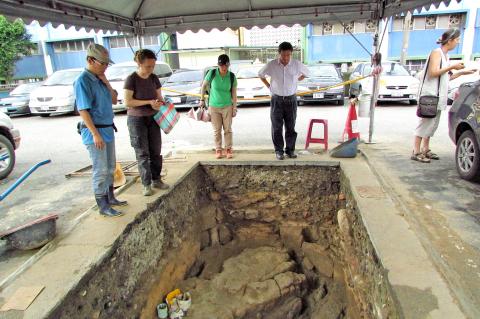An archeology team has uncovered the foundations of a Spanish chapel on an island off northern Taiwan.
Scientists said that it is an important discovery which sheds light on the history of the European colonial era during the 17th century.
The chapel was part of the Fort San Salvador complex on Heping Island (和平島) in a strategic position at the mouth of Keelung harbor and was built by the Spanish during their brief occupation of northern Taiwan more than 300 years ago.

Photo: Lu Hsien-hsiu, Taipei Times
The excavation is an international collaboration between the Academia Sinica, headed by project leader Tsang Cheng-hwa (臧振華), and an archeological research team from Spain.
Tsang, a research fellow at Academia Sinica’s Institute of History and Philology, said three corners of the chapel’s foundations were uncovered at the dig, which is taking place at a parking lot on the island.
He added that skeletal remains of two males were found at the site, one complete skeleton and another which was incomplete. The remains were judged to be contemporaneous with the fort complex.
“Right now we are not sure if the remains belong to the Spanish, or the Formosan Aborigines who were the main inhabitants of the northern coast during that time. So DNA tests will be conducted to determine their origin... It could turn out that these are the oldest evidence of the Spanish occupation yet found in Taiwan,” Tsang said.
Tsang said the dig enabled the team to determine the exact location of the chapel and it correlates with the position shown on maps of the period.
The team found that the Spanish garrison used materials they found on the island to build the chapel, as a section of the wall matched rocks found in nearby hills.
When excavating deeper around the chapel site, the team dug up much older archeological relics dating back to 2,500 to 3,000 years ago, including stone tools, pottery pieces and decorative items made from Taiwanese jade.
“This indicated that ancient civilizations were active on Heping Island and in the whole northern coastal area more than 3,000 years ago. Due to these recent finds, we will expand our excavation efforts around Fort San Salvador in the coming years, because these are important Taiwanese cultural treasures,” Tsang said.
The fort was a key stronghold during the brief Spanish occupation of northern Taiwan in the 17th century.
In 1626, Spain dispatched a fleet of warships from Manila, and sailed to Quelang — the old name for Keelung — as the fort was built that year.
For its defensive fortifications and firepower, at one time Fort San Salvador had 27 copper cannons and six iron cannons, according to Spanish documents.
After some years of battling for trade concessions and colonial holdings, in 1642 Spain ceded the fort to the Dutch, who renamed it Fort Noord-Holland.

Taiwanese can file complaints with the Tourism Administration to report travel agencies if their activities caused termination of a person’s citizenship, Mainland Affairs Council Minister Chiu Chui-cheng (邱垂正) said yesterday, after a podcaster highlighted a case in which a person’s citizenship was canceled for receiving a single-use Chinese passport to enter Russia. The council is aware of incidents in which people who signed up through Chinese travel agencies for tours of Russia were told they could obtain Russian visas and fast-track border clearance, Chiu told reporters on the sidelines of an event in Taipei. However, the travel agencies actually applied

Japanese footwear brand Onitsuka Tiger today issued a public apology and said it has suspended an employee amid allegations that the staff member discriminated against a Vietnamese customer at its Taipei 101 store. Posting on the social media platform Threads yesterday, a user said that an employee at the store said that “those shoes are very expensive” when her friend, who is a migrant worker from Vietnam, asked for assistance. The employee then ignored her until she asked again, to which she replied: "We don't have a size 37." The post had amassed nearly 26,000 likes and 916 comments as of this

New measures aimed at making Taiwan more attractive to foreign professionals came into effect this month, the National Development Council said yesterday. Among the changes, international students at Taiwanese universities would be able to work in Taiwan without a work permit in the two years after they graduate, explainer materials provided by the council said. In addition, foreign nationals who graduated from one of the world’s top 200 universities within the past five years can also apply for a two-year open work permit. Previously, those graduates would have needed to apply for a work permit using point-based criteria or have a Taiwanese company

The Shilin District Prosecutors’ Office yesterday indicted two Taiwanese and issued a wanted notice for Pete Liu (劉作虎), founder of Shenzhen-based smartphone manufacturer OnePlus Technology Co (萬普拉斯科技), for allegedly contravening the Act Governing Relations Between the People of the Taiwan Area and the Mainland Area (臺灣地區與大陸地區人民關係條例) by poaching 70 engineers in Taiwan. Liu allegedly traveled to Taiwan at the end of 2014 and met with a Taiwanese man surnamed Lin (林) to discuss establishing a mobile software research and development (R&D) team in Taiwan, prosecutors said. Without approval from the government, Lin, following Liu’s instructions, recruited more than 70 software